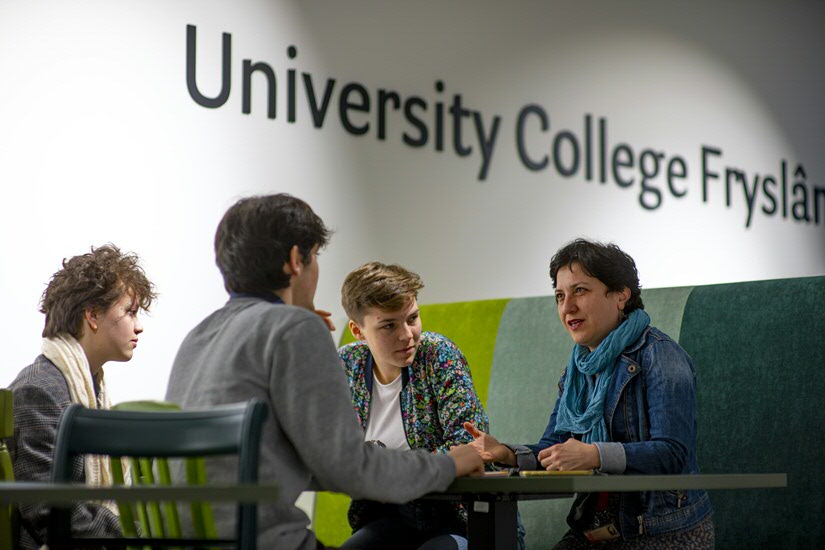Dr. Sepideh Yousefzadeh in Connect: "Global health affects everyone"

The one truly personal touch in her new office at the Beurs building is a quote by famed Persian poet Rumi. She loosely translates the framed quote, written in Farsi: ‘Cherish the one who gambles and loses everything, who doesn’t lose hope and gambles again.’ It says a lot, if not all, about Dr Sepideh Yousefzadeh (50), assistant professor in Global Health at Campus Fryslân. ‘I fell in love with Rumi at a very early age, I keep his poetry close to my heart.’
By Gerard de Jong
Born and raised in Tehran, Iran, Yousefzadeh’s road that led to her teaching Global Health at University College Fryslân in Leeuwarden in Leeuwarden has been impressive. ‘I worked as a midwife in Iran, but became interested in development work. I worked for NGOs with refugees in Afghanistan and Pakistan,’ she says. ‘That sparked my desire for higher education. I landed a spot at Harvard Kennedy School, a beautiful chance to work with people from all over the world.’ Though she cherishes her time at Harvard, it also made her realize that people can have very different perspectives on things. ‘I realized I was an Iranian in a post-9/11 USA. The political reflections were so one-sided and stereotypical, it left me feeling frustrated and angry. It was intimidating.’
Original and challenging education
After her time at Harvard, she worked for UNICEF, did a PhD at the University of Maastricht with a focus on child poverty, went to Groningen for her post-doctoral research and finally wound up in Leeuwarden. She’d be the last to admit it, but she’s made quite a name for herself at Campus Fryslân. Her teaching methods are unconventional and challenging. ‘My aim is to create an environment in which students can share ideas, but also come across difficult situations. To be confronted with people with different opinions. The problem with the education system is that it tends to give too much structure to students. Everything becomes predictable: you have a lecture, and you finish it off with an exam. But the real world can’t be predicted: you don’t have any certainties. I want my students to find things out for themselves, to be curious. I want them to question everything. Even the things I tell them, because what I tell them comes from my own perspective, which differs greatly from theirs.’
Health issues affect us all
Her students may be taken off guard at first, but they duly come through and get on board with Yousefzadeh’s method of thinking outside the box. ‘Just the other day, we had sixty primary school children in here. It was very loud, but very joyful! My first-year students talked to them about health. They showed them, for example, how many sugar cubes there are in the soft drinks that they drink. They showed such teamwork and responsibility! I was impressed with their leadership skills. Another thing that they came up with is the laughing gas problem. Something I wasn’t even aware of myself, happening right here in Leeuwarden! That’s Global Health: it’s not a problem “far away in Africa”, like we were taught thirty years ago. Health issues affect us all. They’re right around the corner.’
Growing up in a bubble
Growing up, Yousefzadeh had to deal with things unfathomable to people in the West. ‘I experienced war throughout all of my childhood. I ran to school when it was literally raining rockets. Staying at home just wasn’t an option. I have a beautiful daughter now, and I realize she is growing up in a bubble. It’s a bubble of prosperity, safety and security: it’s a great bubble, don’t get me wrong! But growing up the way I did made me resilient. It made me the woman I am today.’ ‘And this goes for my students as well. Some of them were born after 9/11. And they take some things for granted, unconsciously. My aim as a teacher is to lure them out of their comfort zone. To create awareness, to make them realize other people have different views on things. But mostly to empower them, to give them the belief that they can make a change in this world.’
Lovely Leeuwarden
Leeuwarden seems like a far cry from the places where Yousefzadeh grew up and lived previously, but she unreservedly embraces it. ‘Oh, Leeuwarden is so lovely! The city and its people are so friendly and welcoming. I feel secure here. Interacting with people here is so easy, it’s beautiful. Even though my Frisian is not very good. I’m lucky people in Leeuwarden speak really good English!’
Connect
This news article originally appeared in Connect. Read the digital version online.
More news
-
15 September 2025
Successful visit to the UG by Rector of Institut Teknologi Bandung
